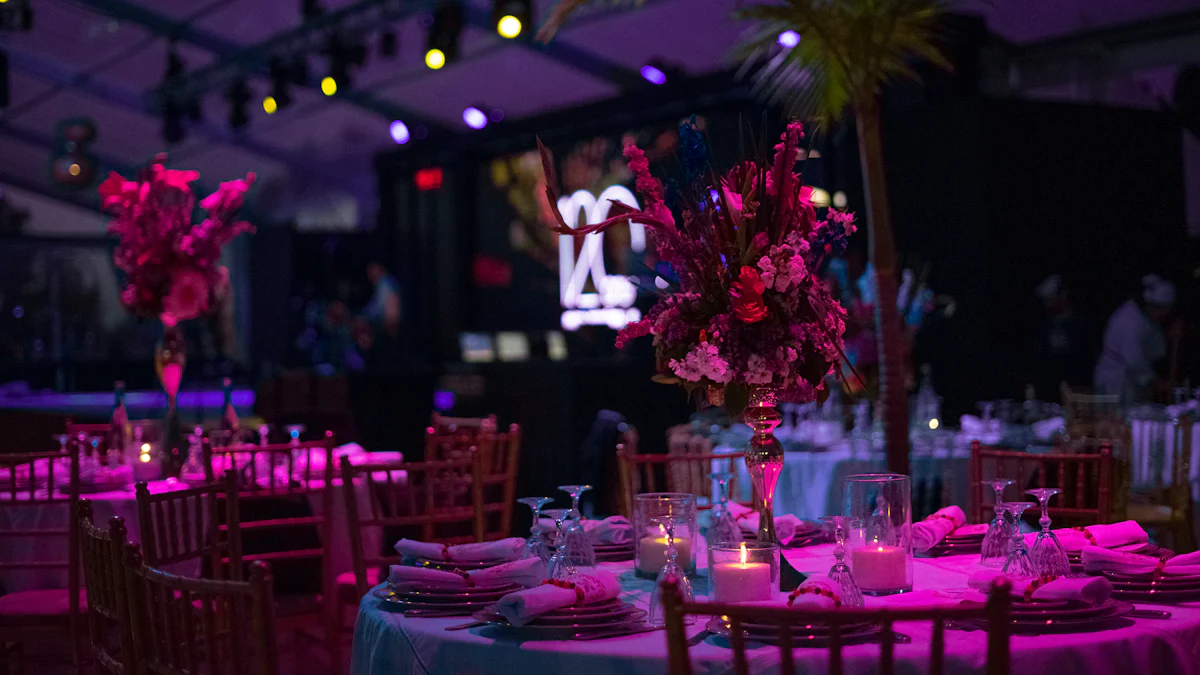Are Event Planning & Management Services the Same?

In the bustling world of events, understanding the difference between Event Planning & Management Services becomes crucial. You might often find these terms used interchangeably, leading to confusion. However, they serve distinct roles. Event planning focuses on the creative and organizational aspects, while management ensures smooth execution. As the event industry grows at a remarkable rate, distinguishing these roles helps you make informed decisions. This clarity not only enhances your event's success but also aligns with the industry's projected growth of 23.7% from 2021 to 2028.
Event Planning & Management Services: Definitions
Understanding the nuances of Event Planning & Management Services can significantly enhance your ability to organize successful events. Let's delve into the specifics of each role.
Understanding Event Planning
Event planning involves the creative and strategic aspects of organizing an event. As an event planner, you focus on the vision and overall concept of the event. Your role is to ensure that every detail aligns with the client's expectations and objectives.
Key Responsibilities
Conceptualization: You develop the theme and design of the event.
Budgeting: You create and manage the event budget to ensure financial feasibility.
Vendor Coordination: You select and negotiate with vendors to secure the best services and prices.
Timeline Creation: You establish a timeline for the event's preparation and execution.
Skills Required
To excel in event planning, you need a specific set of skills:
Effective Communication: You must communicate clearly with clients, team members, and vendors. This skill ensures everyone is on the same page.
Strong Interpersonal Skills: Building relationships is crucial. You need to work well with diverse groups of people.
Negotiation Skills: You often negotiate contracts and terms with vendors. This requires a keen understanding of value and cost.
Expert Testimony: According to Recruitment and Selection Strategies for Event Planning Teams, "Effective communication is crucial in event planning, whether it’s with clients, team members, or vendors. Strong interpersonal and negotiation skills are essential."
Understanding Event Management
Event management focuses on the execution and logistical aspects of an event. As an event manager, you ensure that the event runs smoothly from start to finish.
Core Functions
Logistics Coordination: You oversee the setup, execution, and breakdown of the event.
Team Supervision: You manage the event staff and volunteers to ensure efficient operations.
Problem Solving: You address any issues that arise during the event to maintain a seamless experience.
Compliance and Safety: You ensure the event adheres to all regulations and safety standards.
Skills Required
Event management demands a different skill set:
Strong Communication and Negotiation Skills: You must effectively communicate with your team and negotiate with vendors to ensure everything goes as planned.
Organizational Skills: Keeping track of multiple tasks and details is essential for a successful event.
Leadership Abilities: You lead your team and make quick decisions to solve problems efficiently.
Expert Testimony: Expert Insights highlights the importance of "strong communication and negotiation skills" in event management.
By understanding these roles, you can better appreciate how Event Planning & Management Services contribute to the success of any event. Each role requires distinct skills and responsibilities, yet both are integral to creating memorable experiences.
Event Planning & Management Services: A Comparative Analysis

Understanding the differences between Event Planning & Management Services can help you make informed decisions for your events. Let's explore these distinctions in roles and scope.
Differences in Roles
Planning vs. Execution
In Event Planning & Management Services, the roles of planning and execution differ significantly. As an event planner, you focus on the creative process. You develop the concept and design of the event. Your responsibilities include budgeting, vendor selection, and timeline creation. You ensure that every detail aligns with the client's vision.
On the other hand, event managers handle the execution. They oversee logistics and ensure the event runs smoothly. Their tasks include coordinating the setup, managing the event staff, and addressing any issues that arise. Event managers ensure compliance with safety standards and regulations.
Key Insight: Event planners concentrate on the aesthetic and thematic components, while event managers prioritize logistical and operational aspects.
Pre-event vs. On-site Responsibilities
Event Planning & Management Services also differ in terms of pre-event and on-site responsibilities. As a planner, your work primarily occurs before the event. You create the blueprint for the event's success. Your role involves strategic planning and coordination with vendors and clients.
In contrast, event managers take charge on the day of the event. They ensure everything goes according to plan. Their focus is on real-time problem-solving and team supervision. Managers ensure that the event adheres to the planned schedule and meets client expectations.
Differences in Scope
Strategic vs. Tactical Focus
The scope of Event Planning & Management Services varies in strategic and tactical focus. Event planners adopt a strategic approach. They consider the long-term goals and objectives of the event. Planners develop a comprehensive plan that aligns with the client's vision.
Event managers, however, focus on tactical execution. They implement the plan and manage day-to-day activities. Managers coordinate with vendors and staff to ensure seamless operations. Their role involves making quick decisions to address any unforeseen challenges.
Comparative Insight: Event planners oversee the entire planning process from concept to execution, while event coordinators focus on the logistics of the event itself.
Long-term vs. Short-term Involvement
Event Planning & Management Services also differ in terms of involvement duration. Planners engage in long-term involvement. They work closely with clients from the initial concept to the final design. Planners ensure that every aspect aligns with the client's vision and goals.
Event managers, in contrast, have short-term involvement. Their primary focus is on the event day. Managers ensure that the event runs smoothly and efficiently. They address any issues that arise and ensure the event's success.
By understanding these differences, you can better appreciate the unique contributions of Event Planning & Management Services. Each role plays a vital part in creating memorable and successful events.
The Interrelationship Between Event Planning and Management

Understanding the connection between Event Planning & Management Services enhances your ability to create successful events. These roles, while distinct, work together to ensure a seamless experience.
Complementary Nature
Seamless Transition from Planning to Execution
In Event Planning & Management Services, the transition from planning to execution is crucial. As an event planner, you lay the groundwork by developing the concept and organizing details. Your meticulous planning sets the stage for the event manager to take over. The manager ensures everything unfolds smoothly on the day of the event. This seamless handoff is vital for maintaining the event's integrity and achieving the desired outcome.
Collaborative Efforts for Success
Collaboration between planners and managers is key to success. You, as a planner, focus on the creative vision, while the manager handles logistics. Together, you coordinate efforts to align with the client's goals. This partnership ensures that every aspect, from design to execution, meets expectations. By working closely, you can address challenges and adapt to changes, ensuring a memorable event.
Real-world Examples
Case Study: A Successful Corporate Event
Corporate Event Planning: In a recent corporate event, planners developed a theme that resonated with the company's brand. They coordinated with vendors and managed the budget effectively. On the event day, managers executed the plan flawlessly. They supervised staff and ensured compliance with safety standards. This collaboration resulted in a successful event that impressed attendees and met business objectives.
Case Study: A Wedding Event
Wedding Event Planning: For a wedding, planners crafted a personalized experience by focusing on the couple's vision. They selected venues, arranged catering, and designed the decor. Managers then took charge on the wedding day. They coordinated the timeline, managed vendors, and addressed any issues. This teamwork created a seamless and joyous celebration for the couple and their guests.
By examining these examples, you can see how Event Planning & Management Services complement each other. Each role contributes uniquely to the event's success, highlighting the importance of collaboration and effective communication.
Making the Choice: Event Planner or Manager?
Choosing between Event Planning & Management Services depends on several factors. Understanding these can help you make the right decision for your event.
Factors to Consider
Type and Scale of Event
The type and scale of your event play a crucial role in deciding whether you need an event planner or manager. For large-scale events like corporate conferences or weddings, both roles might be necessary. Planners excel in organizing and conceptualizing, while managers ensure everything runs smoothly on the day. Smaller events may only require one role, depending on complexity.
Budget Constraints
Your budget also influences this decision. Event Planning & Management Services come with different costs. Planners often work on the creative aspects, which might involve higher upfront costs. Managers focus on execution, which can vary based on the event's needs. Assess your budget to determine which service aligns best with your financial constraints.
Understanding the key differences between event planning and management helps you make informed decisions. Event planning focuses on creativity and organization, while management ensures smooth execution. Both roles are essential for a successful event.
Evaluate Your Needs: Consider the type and scale of your event. Large events may require both planners and managers.
Budget Wisely: Align your budget with your needs. Planners often involve higher upfront costs, while managers focus on execution.
Survey insights show that understanding attendee preferences enhances event success. Carefully evaluate your requirements to choose the right service.
See Also
Human Resources Experts: Working from Home vs Traditional Office
Contrasting Technical Authors and Content Creators
